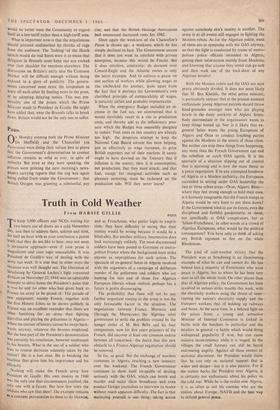PaUS.
ON Monday evening both the Prime Minister (in Sheffield) and the Chancellor (on tjanorcona) were doing their valiant best to prove that the Government's determination to combat inflation remains as solid as ever, in spite of setbacks. But even as they were speaking, the Presses were printing the next morning's news- papers carrying reports that the rug Was again being pulled from under the Government: that British Oxygen was granting a substantial pay
rise; and that the British Haulage Association had announced increased rates for 1962.
Once again the weakness of the Chancellor's Pause is shown up: a weakness which he has simply declined to face. The Government asserts that it does not want to intertere with private .enterprise, because this would be Fascist. But it does interfere, constantly; its decision over Cunard-Eagle and the Atlantic routes is only the latest example. And to enforce a pause on one section of workers while allowing wages to rise unchecked for another, quite apart from the fact that it destroys the Government's own cherished principle of comparability of wages, is certainly unfair and probably impracticable.
When the emergency Budget included an in- crease in the fuel tax, we commented that it• would inevitably result in a rise in production costs, and thereby add to the inflationary pres- sure which the Budget was ostensibly designed to reduce. Fuel costs in this country are already too high: the desperate attempt to keep the National Coal Board solvent has been helping, just as effectively as wage increases, to price British exporters out of their markets. It surely ought to have dawned on the Treasury that if inflation is the enemy, then it is consumption, not production, that they must attack; and that fuel, except for marginal, activities such as pleasure motoring, must be reckoned on the production side. Will they never learn?






































 Previous page
Previous page